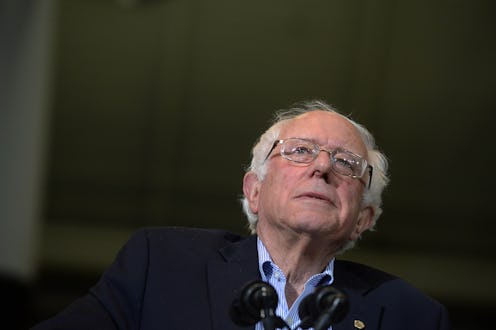News
Bernie's Black Lives Matter History Is Turbulent
On Tuesday, the five candidates vying for the Democratic nomination will face off for the first Democratic primetime debate. The CNN-moderated event will see the candidates outlining their positions on a number of issues, like health care, student loan debt, and foreign policy, but one topic that will likely get more stage time than during the Republican debate is Black Lives Matter. In the last year, the national movement has become a cornerstone of public discourse and social policy, and perhaps no candidate has been as personally involved as Bernie Sanders. In preparation for Tuesday's big debate, here is a look at Bernie Sanders' history with Black Lives Matter.
First and foremost, it's important to establish that the movement for racial and social justice is a main component in Sanders' platform. On his official campaign site, the Vermont senator dedicates a section to "Racial Justice" on his Issues page, in which Sanders slams police brutality and systematic discrimination with the same fervor as the Black Lives Matter activists themselves. In the text, Sanders states:
Sandra Bland, Michael Brown, Rekia Boyd, Eric Garner, Walter Scott, Freddie Gray, Tamir Rice, Samuel DuBose. We know their names. Each of them died unarmed at the hands of police officers or in police custody. ... Violence and brutality of any kind, particularly at the hands of the police sworn to protect and serve our communities, is unacceptable and must not be tolerated. We need a societal transformation to make it clear that black lives matter, and racism cannot be accepted in a civilized country.
In addition to police reform, closing the wealth gap is another crux in Sanders' platform, and he's been very vocal about how it matters even more for African-American and Hispanic communities.
It's clear that Sanders' views align with the movement, but it hasn't always been a smooth partnership. Here's a history of Sanders and the Black Lives Matter movement, including a very up-close-and-personal encounter.
BLM Protesters Confront Martin O'Malley And Sanders
Sanders was first confronted by Black Lives Matter activists in July at the Netroots Nation conference in Phoenix, where Sanders and fellow candidate Martin O'Malley were scheduled to speak in front of a crowd of staunchly liberal supporters. However, midway through O'Malley's speech, about 30 Black Lives Matter protesters entered the town hall and started demanding answers relating to racial violence. While O'Malley was visibly flustered, Sanders took the stage undaunted by the protest and assured the crowd, "We need a political revolution in this country."
BLM Protesters Take The Stage At Sanders' Speech
The single most defining moment in Sanders' relationship with Black Lives Matter came in August, when another group of protesters confronted the senator at a speech in Seattle. This time, Sanders not only allowed them to be heard, but he even gave them the stage. Just as he began delivering comments on social security and Medicare, activist Marissa Johnson stormed the stage and directed the focus of the event to Black Lives Matter. Instead of objecting or calling for security, Sanders gave Johnson and fellow activists the microphone and stood by in silent cooperation, despite persistent boos from the crowd. It's hard to imagine any other presidential candidate being capable of such a kindred gesture.
Sanders Meets With Prominent BLM Leaders
About a month after the Seattle incident, which threw Sanders even deeper into the Black Lives Matter movement, the senator sat down with some of the movement's most prominent activists, including Johnetta Elzie, DeRay McKesson, Brittany Packnett, and Samuel Sinyangwe. The activists' main objective was to discuss their Campaign Zero initiative, which aims to reform policing and end systematic discrimination, with Sanders, who Sinyangwe said was "willing to learn, to better understand how to directly confront and address past and present racial inequities." After the hour-long meeting, Sanders issued his own statement:
I look forward to a continuing dialogue with Campaign Zero and other voices from communities of color to address deeply entrenched racial and economic problems in our country.
